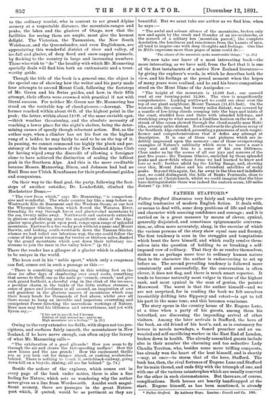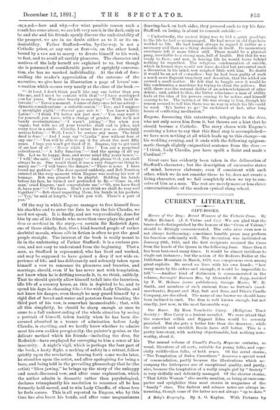FATHER STAFFORD.*
Father Stafford illustrates very fairly and readably two pre- vailing tendencies of modern English fiction. It deals with, or seems to deal with, some deep problems of life and religion and character with amazing confidence and courage ; and it is carried on in a great measure by means of clever, cynical, generally disjointed, and sometimes epigrammatic conversa- tion, or, often more accurately, slang, in the exercise of which the various persons of the story show equal ease and fluency, The first tendency is seen in the struggles and temptations which beset the hero himself, and which really resolve them- selves into the question of holding to or breaking a self- imposed vow of celibacy. That they do so resolve themselves, strikes us as perhaps more true to ordinary human nature than to the character the author is endeavouring to set up before IA. The second prevailing tendency is followed more consistently and successfully, for the conversation is often clever, it does not flag, and there is much smart repartee. It tends to become naturally most vulgar in those of the highest rank, and most cynical in the man of genius, the painter Morewood. The worst is that the author himself—and we are not surprised, for in reading the book we felt ourselves irresistibly drifting into flippancy and retort—is apt to tell his part in the same tone, and this becomes wearisome.
The story opens in the country house of Mr. Eugene Lane, at a time when a party of his guests, among them his betrothed, are discussing the impending arrival of other visitors. Among the later arrivals is Stafford, the hero of the book, an old friend of his host's, and, as is customary for heroes in novels nowadays, a famed preacher and an un- wearied and self-sacrificing worker in the East End of London, broken down in health. The already assembled guests include also in their number the charming and too seductive Lady Claudia Territon, who, besides some more trifling conquests, has already won the heart of the host himself, and is shortly —nay, at once—to storm that of the hero, Stafford. The book has, then, the rival fortunes of Eugene Lane and Stafford for its main thread, and ends fitly with the triumph of one, and with one of the various catastrophes which are usually reserved for the other in such circumstances. But there are, of course, complications. Both heroes are heavily handicapped at the start. Eugene himself, as has been mentioned, is already
• Father Stafford. By Anthony Hope. London : Camel' and Co. 1891.
enEa;ed,—how and why,—for what possible reason such a result has come about, we are left very much in the dark, only as he and she and his friends openly discuss the undesirability of the prospect, we are in no doubt either as to it or its un- desirability. Father Stafford—who, by-the-way, is not a Catholic priest, at any rate at first—is, on the other hand, bound by a vow not to marry : to devote himself to his work, to fast, and to avoid all earthly pleasures. The character and motives of the lady herself are explained to us, but though she is possessed of considerable power of sprightly conversa- tion, she has no marked individuality. At the risk of fore- stalling the reader's appreciation of the outcome of the narrative, we give here in illustration a page of lovers' con- versation which occurs very nearly at the close of the book :—
" At least, I don't think you'll like any one better than you like me, and I must be content with that.'—' I have worshipped you for years. Was ever beauty so exacting ?'—' With lucid in- tervals ?'—' Never a moment. A sense of duty once led me astray— dynastic considerations - a suitable cousin.'—' Yes ; and I suppose a moonlight night.'—' Pereant guae ante te ! You know a little Latin ?'—' I think I'd better not just now.'—' You may want it for yourself, you know, with a change of gender. But we'll not bandy recriminations.'—' I wasn't joking.'—' Not when you began ; but with me all your troubles shall end in jokes, and every tear in a smile. Claudia, I never knew you so alarmingly serious before.'—' Well, I won't be serious any more. . The fatal deed is done.'—' And I may say " Claudia " now without fear of
any one You will be able to say it for about the next fifty years. I hope you won't get tired of it. Eugene, try to get tired
of me last of Never while I live ! You are a perpetual refreshment.'--' A lofty function !'—' And the spring of all my life. Let us be happy, dear, and never mind fifty years hence!— ' I will,' she said ; and I am happy.'—' And, please God, you shall always be so. One would think it was a very dangerous thing to marry me !'—` I will brave the danger.'—' There is none. I have found my goddess!—The door opened suddenly, and Bob Territon entered at the very moment when Eugene was sealing his vow of homage. Bob was pleased to be playful. Holding his hands before his face, he turned and pretended to fly.—' Come in, old man,' cried Eugene, 'and congratulate me.'—' Oh, you have fixed it, have you?'—' We have. Don't you think we shall do very well together ? '—Bob stood regarding them, his hands in his pockets. —` Yes,' he said at length, I think you will. There's a pair of you.'" Of the way in which Eugene manages to free himself from his shackles and to enter the lists to win the fair Claudia, we need not speak. It is finally, and not very creditably, done for him by one of his friends who more than once plays the part of dens es machind in the story,—a certain Sir Roderick Ayre, one of those elderly, fast, blasi, kind-hearted people of rather doubtful morals, whose rtde in fiction is often to put the good people straight. The interest of the book is really meant to lie in the unfettering of Father Stafford ; it is a curious pro-
cess, and not easy to understand from the beginning. That a man, as Stafford is represented, who has lived and worked, and may be supposed to have gained a deep if not wide ex- perience of life, and has deliberately and solemnly taken upon himself a vow to renounce its pleasures and luxuries, and marriage, should, even if he has never met with temptation, not know when he is drifting towards it, is, we think, unlikely. That he should quietly allow himself to fall into the luxurious,
idle life of a country house, as this is depicted to be, and to spend his days in charming t6te-à-tcltes with Lady Claudia, and not know his danger, even though be may guard himself by a rigid diet of bread-and-water and potatoes from breaking the
third part of his vow, is somewhat inconceivable ; that, with all this simplicity, he should be sharp enough at once to come to a full understanding of the whole situation by seeing a portrait of himself, taken hastily when he has been dis- covered absorbed in a trance of admiration before Lady Claudia, is startling, and we hardly know whether to admire
most his own sudden perspicacity, the painter's genius, or the delicate method which his friends—including the dens, Sir Roderick—have employed for conveying to him a sense of his insecnrity. A night's vigil, which is perhaps the best part of the book, a hasty flight, a seeking of safety in a retreat, follow
quickly upon the revelation. Issuing forth some weeks later, he stumbles upon the artist, and after apologising for being a bore, and being told in the prevailing phraseology that he (the artist) "likes jawing," he brings up the story of the unhappy and much-discussed vow, and after some explanation, which the author admits is dramatic rather than psychological, declares triumphantly his resolution to renounce all he has formerly held sacred, and to win Lady Claudia, of whose love be feels secure. This is all reported to Eugene, who by this time has also burst his bonds, and after some magnanimous drawing-back on both sides, they proceed each to try his fate. Stafford, on losing, is about to commit suicide:—
"Undoubtedly, the easiest thing was to bid a quiet good-bye to the life he had so mismanaged. He had never in old days been wedded to life. He had learnt always to regard it rather as a necessary evil than as a thing desirable in itself. Its momentary sweetness left it more bitter still. There would be a physical pang, inevitable to a strong man, full of health. But this he was ready to face ; and now, in leaving life he would leave behind nothing he regretted. The religious condemnation of suicide, which in former days would not have decided but prevented such a discussion in his mind, now weighed little with him. No doubt it would be an act of cowardice : but he had been guilty of such a much more flagrant treachery and desertion, that the added sin seemed a small matter. Ho felt that to boggle over it would be like condemning a murderer for trying to cheat the gallows. But still, there was the natural dislike of an acknowledgment of utter defeat ; and, added to this, the bitter reluctance a man of ability feels at the idea of his powers ceasing to be active, and himself ceasing to be. The instinct of life was strong in him, though his reason seemed to tell him there was no way in which his life could be used. 'It's better to go ! ' he exclaimed at last, after long hours of conflicting meditation."
Eugene, foreseeing this catastrophe, telegraphs to the deus, who not only saves him from it, but throws out a hint that he should become a Catholic. The story closes with Eugene's receiving a letter to say that this final step is accomplished— we have seen nothing at all which leads up to this change—on his wedding evening, and it ends with the following epigram- matic though slightly enigmatical sentence from the dens
I think, Lady Claudia, you have spoilt a Saint and made a Cardinal !"
Great care has evidently been taken in the delineation of Stafford's character ; but the description of successive states of mind, however elaborate, even if consistent with each other, which we do not consider these to be, does not create a living character, and we fail completely when we try to con- ceive of him as a man. The rest are merely more or less clever- conversationalists of the modern cynical slang school.











































 Previous page
Previous page